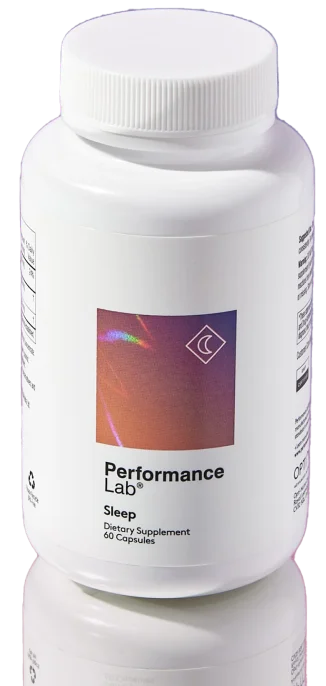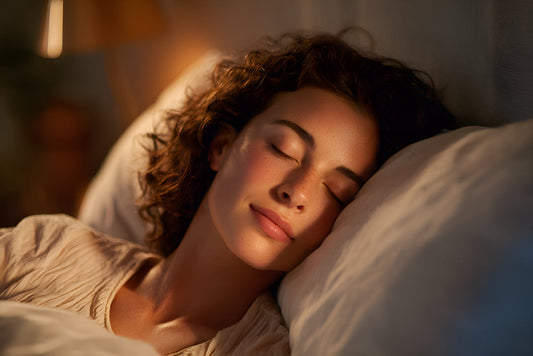Melatonin is one of the most popular sleep aids around. According to a Sleep Foundation report, 27% of American adults admit to taking it to help them get a good night’s sleep. After all, it’s readily available and prescription free. (1)
But is it addictive, and can you build up a tolerance to it?
The short answer is that melatonin is not considered addictive, but some people may develop a psychological dependence if they use it regularly. Read on for sleep tips and advice...
How Melatonin Works

Melatonin is a natural hormone that is produced by the pineal gland in the brain in response to darkness.
It’s commonly known as the ‘sleep hormone’ because it regulates your body’s sleep-wake cycle, also known as your circadian rhythm or your 24-hour internal clock. Therefore helping with sleep regulation.
Your body makes melatonin in varying amounts depending on what time of day it is and how light it is wherever you are. So, it gets produced more at night and when it’s dark, and less during the day or when it’s bright.
While melatonin doesn’t force you to go to sleep, it signals to your body that it’s time to wind down, a chemical reminder to get ready for sleep.
Melatonin also has anti-inflammatory and antioxidant properties, regulates blood pressure, immune function, and body temperature.
Studies have shown that it may also help to enhance GABA - Gamma Aminobutyric Acid - a neurotransmitter that helps calm the central nervous system. The two working together may help to reduce sleep deprivation-related anxiety and improve sleep quality. (2)
If you are having trouble sleeping, you may be considering taking a melatonin supplement to help improve your sleep or remedy your insomnia.
Who Might Benefit from Melatonin Tablets?
According to the National Center for Complementary and Integrative Health, taking melatonin may help people with:
-
Jet lag from flying through different time zones
-
Delayed Sleep-Wake Phase Disorder (people struggling to sleep during normal sleep times)
-
Anxiety before and after surgery
-
Some sleep disorders in children - please see your doctor before giving melatonin to children. (3)
It has also been used to help with circadian rhythm disorders by shift workers, people who are blind, and more. (4) In these cases, melatonin is considered a treatment to help regulate sleep and circadian rhythms.
The production of melatonin also declines as we age, due to stress, certain health conditions, or your environment. (5) However, be aware, that the American Academy of Sleep Medicine do not recommend giving melatonin to older adults with dementia.
Melatonin may also stay active in older people for longer than with younger people, potentially causing daytime drowsiness . Which is why it’s important to start low and to avoid super high synthetic dosages. (6)
Performance Lab Sleep offers a low dose of natural melatonin from Montmorency tart cherries.
What Happens When you Take Melatonin Supplements?

Melatonin supplements potentially aid in sleep by increasing the levels of melatonin circulating in your body, thus helping to regulate your sleep-wake cycle, and hopefully helping you to feel sleepy. (7)
The supplement comes in natural and synthetic forms and is often used for insomnia, jet lag, sleep disorders, or night shift workers.
It’s important to mention that melatonin supplements are not regulated by the FDA, leading to variability in the amounts of melatonin in various products. Many synthetic melatonin supplements contain levels of melatonin that can range from 80% to 400% of the advertised amount. (8)
As such, it’s important to note the dosages included, any additional ingredients and - we can’t stress this enough - buy from a reputable manufacturer. Lower doses of melatonin are often sufficient for sleep regulation and may reduce the risk of side effects such as grogginess.
While melatonin is safe for short-term use, the research on long-term use is still inconclusive. But one question that everyone may have is, can you become addicted to it?
Is Melatonin Addictive?
Unlike some sleeping pills, melatonin is not addictive in the same sense that drugs and alcohol can be. You don’t get withdrawal symptoms or dependence when you are taking it as it is a naturally produced hormone.
Unlike other sleep medications, it also doesn’t cause a sleep hangover, and you shouldn't build a tolerance to it that causes you to take more and more of it to get the same effects. (9) Melatonin is considered safe for most people when used as directed.
Doctors normally recommend that you take it for temporary relief of sleep issues while seeking other methods to help you sleep, or as a short-term solution for correcting your sleep routine in the instance of jet lag or night shifts.
Regardless of how you use it, the research at the time of writing shows that melatonin isn’t addictive.
That said, people can develop a psychological dependence on melatonin. The common perception of needing melatonin to sleep may be a result of psychological dependence rather than physical addiction.
This typically happens if someone becomes anxious about sleeping without melatonin, or believes they can’t sleep naturally - or at all - without it.
Repeated use may increase the potential for psychological reliance, even though it does not cause physical dependence. If this is the case for you, you should re-evaluate your sleep habits and sleep hygiene. (10) Or perhaps swap heavier synthetic forms of melatonin for more natural ones.
More long-term research needs to be done on melatonin. Most people can stop taking melatonin without experiencing withdrawal or other issues.
How Much Melatonin Do You Need? Dosage and Timing

Melatonin dosage can be tricky, and timing plays a very big role. Too small of a dose won’t give you the desired effect, but too large of a dose can put you to sleep for far too long and potentially disarray your sleep cycle.
Typical starting doses range from 0.2 to 5 mg a night, but it’s best to start with a low dose, and then work your way up to whatever you find is the best dose for you. (5) Starting with a small dose, such as 0.3 mg to 1 mg, is often recommended, as it can be effective while minimizing side effects.
Taking too much or higher doses won’t help you sleep any better. Your dosage will also likely depend on your reason for taking it, such as whether you’re just using it to get over temporary jet lag, or if you have a sleep disorder.
Your age, weight, and other medications and supplements you may take also play a role in what dosage you should try.
The timing of when you take it may also play a role. Taking melatonin at the right hours, especially close to your natural bedtime, helps align with your circadian rhythm for optimal results. It’s best to take 30 minutes before you plan on falling asleep. (5) If you take it too early, you may find yourself falling asleep before you are ready to, or even in dangerous situations.
If you find yourself getting drowsy and try to fight it, you are diminishing the effects of the melatonin and it might end up not working overall.
Melatonin Side Effects
Melatonin can affect individuals differently, so side effects may vary from person to person.
The most common side effect of melatonin is vivid dreams, as many people have reported. So, even if you start sleeping better, the dreams you have while asleep might be jarring at first.
Other side effects include headaches, nausea, dizziness, and stomach cramps. Side effects don’t necessarily mean melatonin is addictive, but if you experience a lot of side effects while taking it, you may be taking too high of a dose.
If you are taking an anticoagulant, anti-platelet, immunosuppressant, blood pressure medication, diabetes medication, or contraceptive prescription, then melatonin might negatively interact with them.
Melatonin has a sedative effect so may also make sedation worse in people taking Central Nervous System depressants. (11) You should ask your doctor before you begin a melatonin regimen.
Best Natural Melatonin Supplement

If you do decide to take a melatonin supplement, we recommend Performance Lab Sleep.
This product is a natural sleep aid, providing over-the-counter support to help promote restful sleep. It contains natural low dose melatonin from tart cherries rather than a synthetic option, combined with magnesium to relax muscles, settle nerves, and assist in drifting off into a restful slumber.
It also includes lemon balm to reduce anxiety, and tryptophan which the body can then make into its own melatonin, hopefully increasing your levels further.
Just take 2-4 capsules 30 minutes before bedtime to help you fall asleep better with no groggy side effects in the morning. If you want better sleep, Performance Lab Sleep may help promote and stabilize your circadian rhythm.


Tips to Help you Fall Asleep and Sleep Better
Focusing on good sleep practices, or sleep hygiene, rather than relying on melatonin supplementation should be your foremost choice for promoting good sleep, and only using the melatonin when needed and as prescribed. Good sleep habits include:
-
Being consistent with your bedtimes and maintaining a consistent wake up time. Going to sleep and waking at the same time every single day will help your body regulate its sleep-awake cycles without the need for extra melatonin long-term.
-
If you do need melatonin, taking it at consistent times and going to sleep and waking at consistent times will also help your body regulate itself alongside the melatonin.
-
Use blackout curtains, sleep masks, or earplugs to make sure your room is dark and quiet and there are no distractions around you preventing sleep.
-
Putting away cell phones, TVs, computers, and all electronics before going to bed. These devices emit blue light that can interfere with your body’s natural melatonin production. Limit your use before bed or use a blue light reducing filter.
-
Instead have a wind-down routine, such as a warm bath before bed.
-
Spending time outside in the morning after waking will help promote sleep by exposing you to natural light, which helps regulate melatonin production and prepares your body to respond to its increased melatonin levels at night-time. (12)
Experts suggest consulting a sleep expert or doctor for personalized sleep strategies if you continue to have trouble sleeping.
Final Thoughts
Currently, no research shows melatonin is addictive in the physiological sense. Most people can use melatonin safely without risk of addiction. But since it can promote better sleep (and who doesn’t want more sleep!) it may cause you to rely on melatonin to get good sleep.
Therefore, it’s important to take it as prescribed, in as low of a dose as possible, and only when needed.
You may also find that natural sources of melatonin such as that found in Performance Lab Sleep are just as effective as the synthetic options.
Overall, the answer is no, melatonin is not addictive, and it is safe to take short-term to help support your body in its sleep-wake cycle.
Consult with your doctor if you think you need a melatonin supplement to find the best dosage for you and ensure that you are taking it safely!















